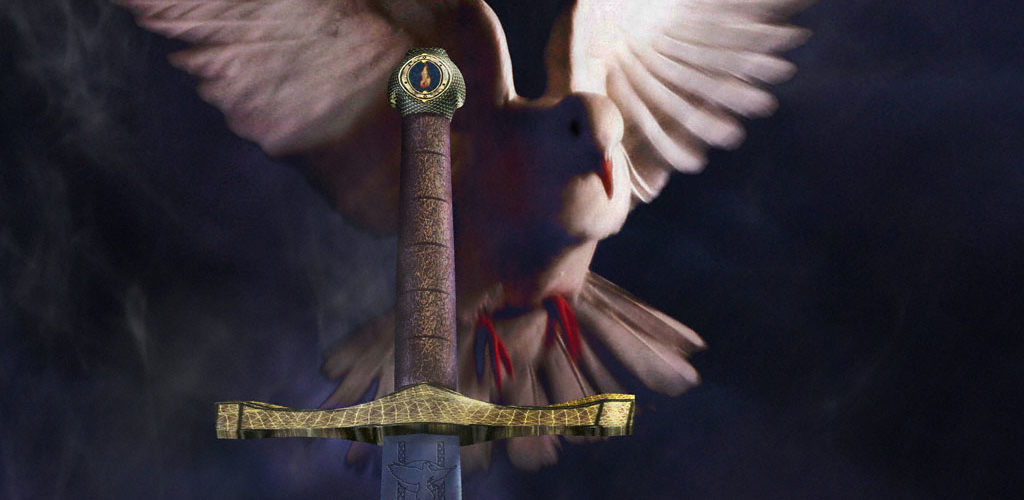Did Jesus Come to Bring Peace or a Sword?
Podcast: Play in new window | Download
Subscribe: RSS
 Please discuss Matthew 10:34 through 39 when Jesus says, “Do not think that I have come to bring peace, but a sword.”
Please discuss Matthew 10:34 through 39 when Jesus says, “Do not think that I have come to bring peace, but a sword.”
Let’s read the entire passage together:
Do not think that I came to bring peace on earth. I did not come to bring peace but a sword. For I have come to “set a man against his father, a daughter against her mother, and a daughter-in-law against her mother-in-law”; and “a man’s enemies will be those of his own household.” He who loves father or mother more than Me is not worthy of Me. And he who loves son or daughter more than Me is not worthy of Me. And he who does not take his cross and follow after Me is not worthy of Me. He who finds his life will lose it, and he who loses his life for My sake will find it.
The last part of this verse is a quotation from Micah 7:6 which says, “For the son dishonoureth the father, the daughter riseth up against her mother, the daughter in law against her mother in law; a man’s enemies are the men of his own house.” In the prophecy of Micah, we see a dialogue between God and Micah. Chapter six of Micah is key to this dialogue because God is setting forth an accusation or “controversy” with the children of Israel and calling for their repentance. Scholars believe that in chapter seven, Micah is speaking on behalf of the faithful congregation within the midst of a rebellious people. Verses 1-6 of Micah chapter six are a description of the wickedness that surrounds the faithful of God. Verses 7-13 are a confession of sin on the part of this congregation and an acceptance of the punishment that the Lord is going to mete out. So having these thoughts in mind, verse 6 is a description of how wicked people are going to act in the presence of the faithful. How will they act? The wicked son will dishonor the father. The wicked daughter will rise up against her mother. The wicked daughter-in-law will do the same against her mother-in-law. In essence, when it comes to wicked people, “a man’s enemies are the men of his own house.”
Now, how does this apply to Matthew 10:34-36? If you go back all the way to the beginning of the chapter you will notice that this chapter concerns the sending of the disciples on the limited commission. The entire chapter is devoted to instruction on what the disciples should expect when they go out into the world and preach the gospel to the “lost sheep of the house of Israel” (verse 6). There are two types of instruction given to the disciples in this chapter. First there is positive instruction as to what they are to do on the limited commission. This comprises verses 5-15. Then there are various and sundry warnings given to the disciples about what they could expect from the unbelievers. This comprises verses 16-42.
The section of scripture with which we are concerned falls within the sundry warnings that Jesus is giving to his disciples regarding the lost sheep of the house of Israel. Jesus words to them are basically this. Don’t expect that you will receive a warm welcome out of the unfaithful. When you preach the gospel, people are going to become your enemies. In this sense, Jesus’ came to bring a sword. The warning of Micah describing the unfaithful holds true here. Even among families, there will be division. This is the typical response of the unfaithful. So Micah’s description of the unfaithful apply to the situation where disciples would be going into the very houses of the unfaithful to preach the gospel, and they were to be aware as to how the unfaithful would respond to this preaching.
One further question presents itself. What applicability does this passage have, if any, today? While the passage specifically addressed what the twelve disciples were to do on the limited commission, we can learn from both Micah and from this passage what the attitude of the unfaithful will be. When it comes to preaching the gospel, the unfaithful will not want anything to do with it. They will oppose it. They will reject it. They will even sever family ties over it if they disapprove of it. It is our responsibility, however, to preach the gospel regardless of what kind of problems that may cause. So this passage serves as a warning to us as well regarding what kind of attitudes we should expect from some people in regard to the preaching and teaching of the truth. We should also note that Jesus mentions that some will respond in a positive way to the gospel. Notice verses 40-42, “He that receiveth you receiveth me, and he that receiveth me receiveth him that sent me. He that receiveth a prophet in the name of a prophet shall receive a prophet’s reward; and he that receiveth a righteous man in the name of a righteous man shall receive a righteous man’s reward. And whosoever shall give to drink unto one of these little ones a cup of cold water only in the name of a disciple, verily I say unto you, he shall in no wise lose his reward.”

